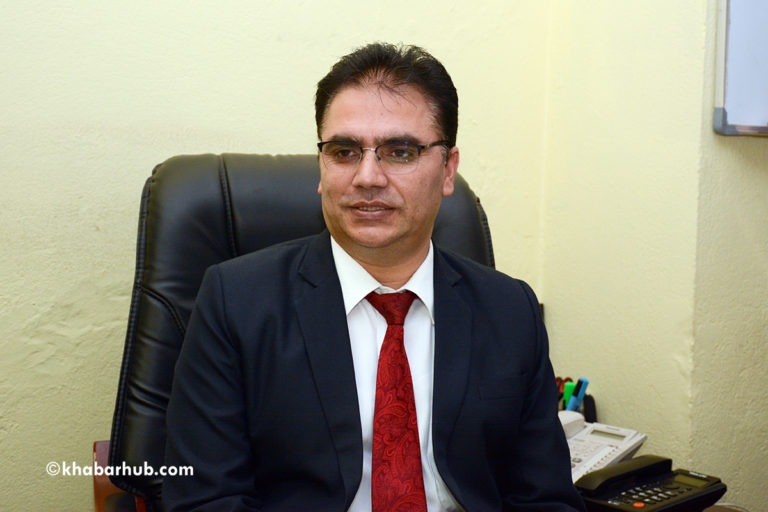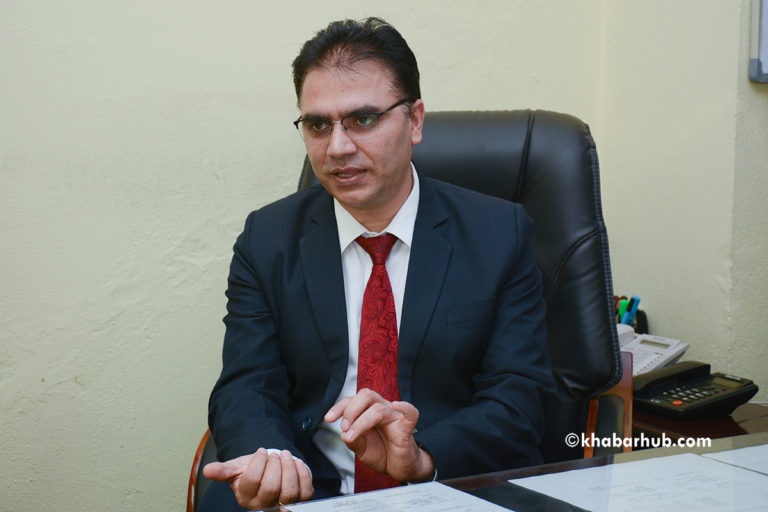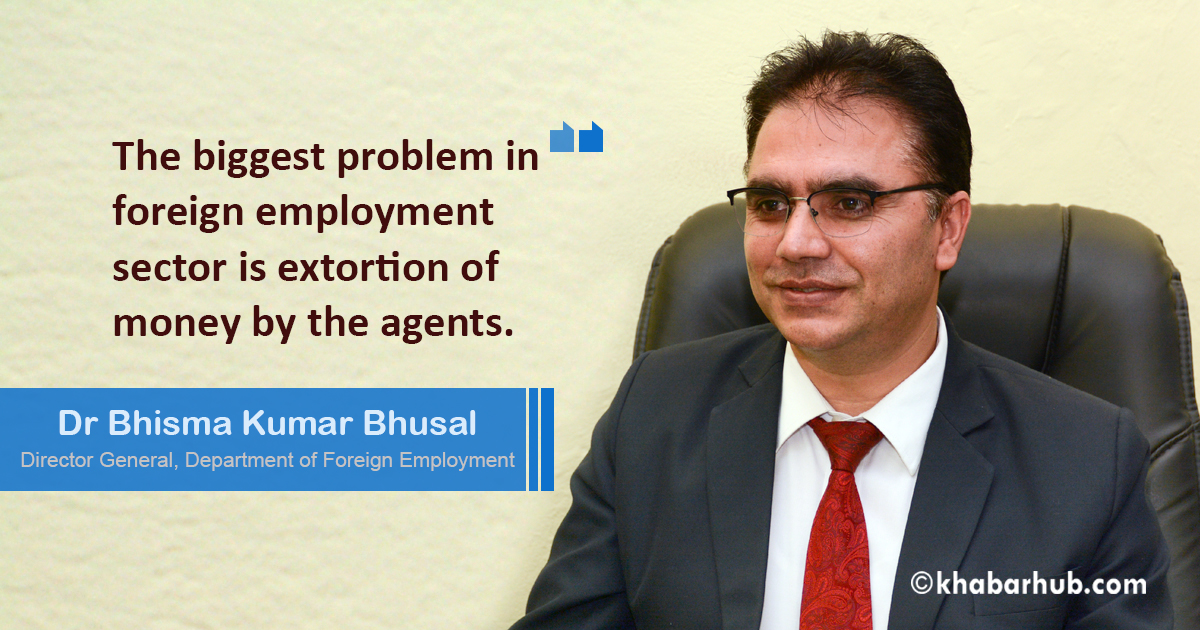KATHMANDU: Government of Nepal has decided to send Nepalese workforce to different parts of the world by fulfilling all the required parameters and standards set for international labor market.
This is the time the government needs to pay more attention on production of more numbers of skilled labor force. This way, we can control accidents, grievous injuries, diseases and mysterious deaths of our workforce working abroad.
The number of Nepalese youth opting for foreign employment has gone down in comparison to previous years. This is, of course, attributed to creation of more employment opportunities in our own country.
However, there are many other issues which are still unaddressed in the foreign employment sector. Foreign employment is still the second biggest source of country’s GNP (Gross National Product). Khabarhub had a talk with Dr. Bhisma Kumar Bhusal, Director General of Department of Foreign Employment, on various contemporary issues of foreign employment. Excerpts:
What are the new developments in ‘foreign employment sector’ in recent times?
Last year we saw different positive reformative steps to organize and restructure the sector of foreign employment. The same has been felt on the ground level by those who are applying for foreign employment and have been working abroad already.
To root out all kinds of shoddy deals and existing anomalies, the Department of Foreign Employment has begun to operate through online system. All kinds of complaints, grievances and requests can be made online with no physical distance and middleman coming on the way as a barrier.
Cases of fraud, cheating and extortion are also being sincerely dealt with and have been put under control. The Department is studying all the aspects of crimes and irregularities prevalent in the foreign employment sector to devise a full-proof system with an aim to check such kind of occurrences.
Recently, there has been a lot of buzz about an amendment to Foreign Employment Act, 2064 BS. What is this amendment for and from when will it apply?
Foreign Employment Act is proposed to be amended this current financial year before it is applied. There are some old issues which appear to be outdated and out of context which are to be weeded out from the Act and new provisions relevant for current context of foreign employment will be added up in the existing Foreign Employment Act.
Process of amendment to the Act has already started and I hope new set of amendments will solve great many problems which are plaguing the foreign employment sector at this moment. After the amended act come into force, complainants will be able to address their grievances and complainants related with foreign employment at local level in their own district where they live.
If grievances (or/and complainants) are not satisfactorily addressed or neglectfully not attended to, then those grievances (or/and complaints) will be sent to the Department. In the new Act, the amount of mandatory reserve money to be deposited by authorized manpower agency has been increased to the tune of Rs 60 million (to be calculated on the basis of number of Nepalese workers sent abroad).
This will play a great role in organizing the functioning of manpower agencies. Those manpower agencies which are blatantly flouting the norms set by the government and indulged in cheating the Nepalese workforce will be taken to task and victims will be paid of their reserve amount which is to be mandatorily deposited with the Department.
There is one interesting provision of merger between the manpower agencies exactly like financial institutions like banks do. If a manpower agency finds it difficult to run a business due to financial reasons or otherwise can opt for merger with some other manpower agencies working in the same field.
Similarly, there is a provision in the act which allows closure of manpower agency by winding up all the business activities if that manpower agency is sending less than 100 Nepalese workforce in foreign employment.

As you said the increase in reserve money and facility for merger are positive changes in the Foreign Employment Act. Why, then, voices of opposition are being raised against these provisions?
No manpower agency is opposing the increase of reserve money to be mandatorily deposited with Foreign Employment Department. Instead, these manpower agencies are demanding interest on the reserve money deposited by them with us.
The Department has conveyed this demand to concerned ministry and now matter is lying with the state. I don’t think manpower agencies are dissatisfied with the Government of Nepal with regard to amendments to Foreign Employment Act, 2064 BS. In fact, new amendments will instill sense of duty and responsibility in both manpower agencies and foreign job aspirants.
What, according to you, are the major problems of foreign employment in the context of Nepal?
The problem in this sector starts right from the demand stage. Authorized manpower agencies get into unhealthy competition in name of bringing demands of jobs from different countries overseas. This has resulted in problems among manpower agencies.
Moreover, there is lack of awareness among foreign job aspirants in Nepal. Nepalese workforce, if they approach manpower agency directly without making proper inquiry before, are likely to be cheated by unscrupulous agents operating in this field. Their hard earned money are extorted in wheeling and dealing at the counter of manpower agencies.
They come to knock at the door of the government after being cheated and defrauded. It is advised to study everything related to challenges and prospects of foreign employment before a person approaches a manpower agency to go in foreign employment. So, we find problems existing at both sides: manpower agencies and foreign job aspirants.
What measures do you suggest to solve the existing problems in sector of foreign employment?
It is not an insurmountable task to find out solutions to the existing problems plaguing the foreign employment sector of Nepal. Firstly, Nepalese workers aspiring for foreign job must know all about the country, nature of job and other necessary aspects related to it before applying for foreign employment.
One must get trained and acquire necessary skills before landing on foreign soils to avoid any untoward problems during the course of employment. Secondly, one should make an inquiry with the concerned foreign department about how much money is to be spent while going abroad in foreign employment. We all know that the biggest problem in sector of foreign employment is extortion of money by agents from foreign job aspirants.
Thirdly, no financial transaction with manpower agencies or any agent should be done outside a channel of a bank – a financial institution. It is because financial transactions through banking channel reduces the possibility of fraud, cheating and embezzlement as records of evidences are already maintained.
The government is also communicating in this regard with local bodies all across the seven provinces so that Nepalese workforce at ground level must know about the proper way of approaching manpower agencies for foreign employment.
Fourthly, the government has taken up issues of financial cheating committed in name of foreign employment with all seriousness. This is why number of complaints regarding financial cheating have gone up recently and all the victims have been assured of appropriate actions against the culprits and return of their money in due course of time.
The Department of Foreign Employment has also started investigating past cases of financial cheating and misappropriation of money by manpower agencies and this has raised hope of recovery of the lost money for victims. Department is also helping the victims in accessing legal help arranging for advocates and helping them file a criminal complaints with the Nepal Police.
It has been made mandatory for Nepali workforce to obtain a certificate of skill training before they apply for foreign employment. Do you think it is possible to implement from immediate effect?
Yes, it is possible. The State has already begun the process in this direction. The government has identified some of the institutes engaged in imparting professional skill and vocational training. These institutions are well equipped with a range of subject areas.
Trainers and teachers who have been working in their respective fields of vocational training on a range of subjects for a long period of time have been brought in. It is the aim of the government to export skilled labor force from Nepal.
Gokarna Bista, Minister for Labor, Employment and Social Security, has made it a point to send only skilled Nepalese labor force in foreign employment. Even if Nepalese labor force with relatively lower skill level are being sent in foreign employment in ongoing financial year, no such things are going to happen from next financial year.
Only those who are skilled in their job will be able to go abroad in foreign employment. We are strictly following this rule only for the benefit of Nepalese workforce. We have discovered that many of the accidental deaths in work hours are taking place due to lack of proper skills.
Similarly, Nepalese workforce catch diseases and lose their body parts in grievous injuries. All these to a great extent attributed to lack of skills in handling the jobs in hand. Sending skilled labor force for foreign employment will reduce such cases and amount of remittances sent to Nepal will also scale up. Let there be no doubt in this regard, the government wants to send (or export) 100 percent skilled and trained labor force to foreign countries.
What is the current state of affairs regarding the production of skilled and trained Nepalese labor force?
The Department of Foreign Employment has zeroed in on 30 institutions engaged in imparting skill and training in different professional and vocational courses. We have hired teachers and trainers who do have more than 5 years of teaching and training experiences in their respective fields.
They are quite capable of imparting skills and training at the present. Some of the trainers are those who have been in foreign employment and now they are back to Nepal. Their experiences and skills are of immense help for new ones who are going abroad in foreign employment.

What is about strict implementation of ‘free-visa-free-ticket’ scheme sponsored by the government of Nepal?
The government has launched the scheme of ‘free-visa-free-ticket’ only for outbound Nepalese workers going to Malaysia and Gulf-countries. However, many manpower agencies have flouted this scheme. The Department has come to know that as high as Rs 500,000 has been paid to manpower agency by the job aspirants to go to Malaysia and Gulf-countries.
We have also come to know that manpower agency issues a receipt of only Rs 10000 to hoodwink the government despite taking money in several hundreds thousands Rupees (in several lakhs) from the back-channel as underhand operation deal.
This is how we become helpless to take actions against them as we do not have any visible evidence regarding extortion of money from the Nepalese workforce. To implement ‘free-visa-free-ticket’ scheme more efficiently, government is now signing MoUs (Memorandum of Understanding) with those countries where Nepalese workers are heading to for work.
The Department has started coordinating with other government agencies in order to stop the cases of financial cheating at individual level to rescue the victims by arranging for compensation to be paid by manpower agencies.
What is your take on the Nepalese workforce who land in the foreign countries illegally without proper documentation?
We have appealed to all Nepalese youth to not take any illegal path in order to go abroad in foreign employment. There are a lot of risks involved when one chooses to go abroad in illegal manner. There is no protection of law and such workers are financially exploited by the brokers and agents on whom they are dependent for sneaking in to another country.
Besides, there is always a possibility of blackmail and undergoing a torture – both physical and emotional. We must not forget these things at all while taking illegal path for overseas employment.
How many Nepalese workforce are currently engaged in foreign employment?
At present as per the government estimate, about 3.7 million Nepalese workers are engaged in foreign employment. About 2.3 million Nepalese workers are employed in Malaysia and Gulf countries while rest of them are distributed among other countries.
In the recent past, as many as 700-900 Nepalese youth have been leaving the country from Tribhuvan International Airport, Kathmandu. In the last fiscal year, a total of 50,500 Nepalese workers left Nepal for foreign employment, which is less than when compared to previous years.
According to data available with the Department of Foreign Employment, there is a gradual decrease in the numbers of Nepalese workers opting for foreign employment. It is all because, there is a new wave of revival of domestic economy of Nepal creating employment opportunities here only back home.









Comment